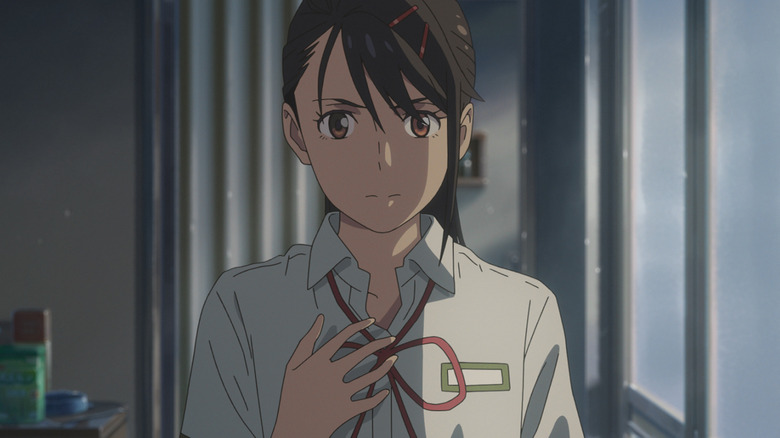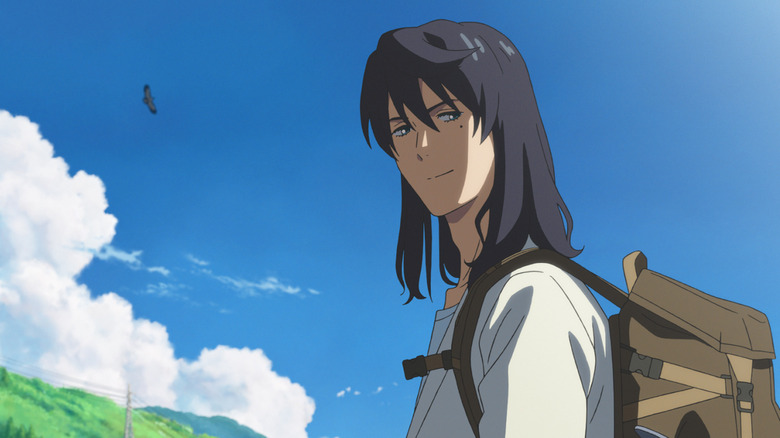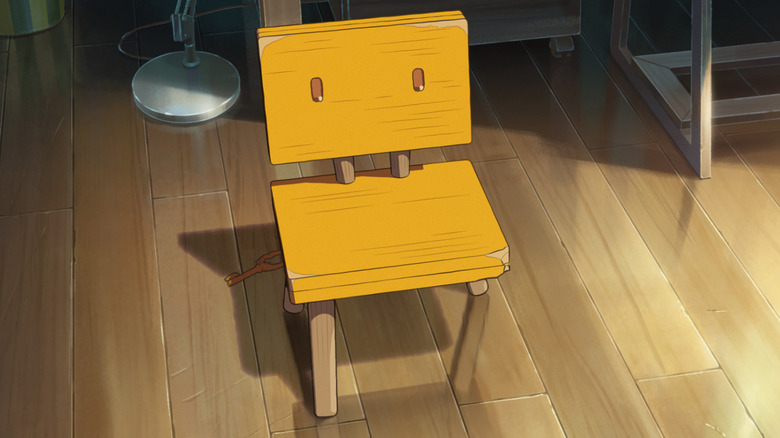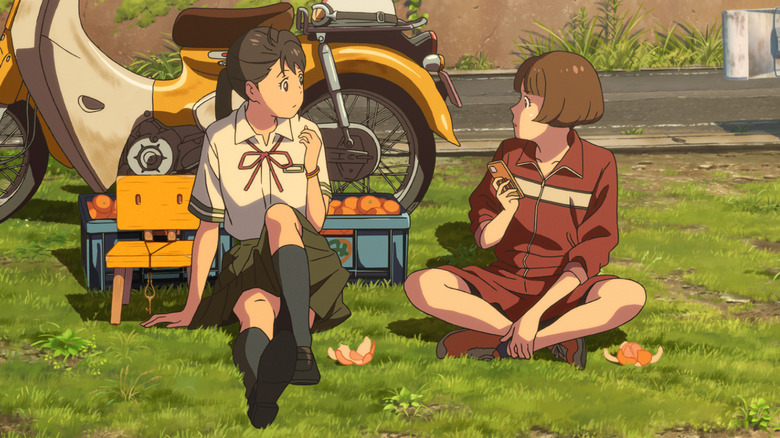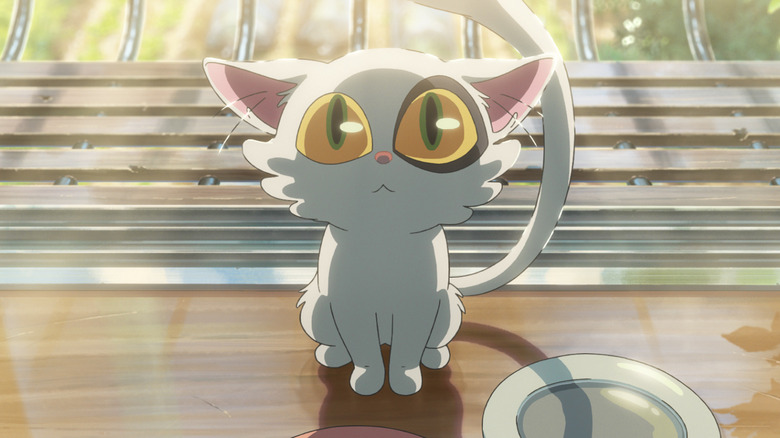Suzume Review: A Heartfelt Exploration Of The Balance Between Magic And Reality
Years ago, I was sent to a screening of a film called "Your Name." I wasn't told until minutes before it started, and I had no idea what I was about to see. It was an anime film by Makoto Shinkai about two young people who switch bodies and learn about each other's lives, and it was so stunningly beautiful and touching that I had to sit in my seat for a bit before I could talk about it. Shinkai is back with another magical teen story in "Suzume," which got me in the gut yet again.
The teenage years are rough. Anyone who has lived through them will tell you that. You're trying to figure out what sort of person you'll be, find your place in the world, deal with massive changes in your body and your feelings, and navigate your love life. I don't know how Shinkai manages to take what can feel, frankly, icky and turn it all into such an aching sweetness that you almost want to relive those years. Almost.
We have so many shows and films about the lives of teens that are much darker or modern, but Shinkai's films examine the part of it that is dramatic but still innocent, tackling both big feelings about the world and little ones about ourselves. He manages to connect what it's like to grow up and feel small and insignificant and blends that with a connection to the larger world and the things that might be hidden underneath it.
Keystones and cats
In the film, Suzume (Nanoka Hara – Japanese, Nichole Sakura – English dub) is a young woman living with her aunt Tanaki (Eri Fukatsu – Japanese, Jennifer Sun Bell – English dub) in a small town in Japan. She often dreams of a ruined yet magical place she found herself as a little girl, calling for her lost mother. As she heads to school one day, she passes a handsome stranger a few years her senior named Sōta (Hokuto Matsumura – Japanese, Josh Keaton – English dub). He's looking for abandoned doors, and Suzume directs him to some ruins in her neighborhood.
She sees what appears to be a giant red worm made of smoke and fire rising from this place while she's in school, though no one else seems to notice it. She runs to the ruins and sees a door to a place that reminds her of her dreams, but she can't get through. She trips over a stone statue that becomes a cat and finds Sōta trying desperately to close the door. An earthquake happens while he closes the door, and he's injured. Suzume takes Sōta home and cleans his wounds, but the cat, Daijin, shows up and speaks to her. The magical cat turns Sōta into the form of a broken kid's chair from Suzume's childhood, so Sōta can't stop him from carrying out his plans.
The now-speaking chair Sōta tells Suzume that the cat was formerly a keystone, a creature that holds the doors to the afterlife shut and prevents the worm that causes earthquakes from coming out. It's his job to find any entry points for the worm and close them, as his grandfather did before him. Of course, now he's a chair, so the two of them set off, girl and chair, to find the cat and return him to his keystone form before a giant earthquake destroys the nation.
Subtle animation choices bring out what we need to see
Unlike "Your Name," where I went in blind, I had an idea about what I'd see with "Suzume." I assumed it would have stunning animation that supported the message of the film. It absolutely delivered. There is a gorgeous blend of textures that look realistic, with the things that are supposed to stand out feeling simpler. You can see it in the pic above, with the more realistic-looking floor and light stand patterns, with the chair, aka Sōta, looking more childlike. As if the things that are important to Suzume belong more to her sense of childhood wonder rather than living in the day-to-day world. The same thing happens with Daijin, who sticks out as a cartoon in a more realistic if pastel, world.
"Suzume" feels like a fantasy to someone who grew up in a place where people aren't quite as helpful as they are where the film takes place. It felt almost unrealistic to see her make friends everywhere she went as she and chair Sōta searched for Daijin. People bring this random girl home, feed her, and let her stay over at their houses. One lady allows Suzume to babysit her kids hours after being picked up as a hitchhiker. It's almost jarring watching her do something that would get her kidnapped or killed in a whole lot of the world. Still, there is an innocence here, a sense of adventure that I don't feel like I've seen outside of movies in the 1980s like "Goonies" or "The Neverending Story."
A magical explanation for a terrible tragedy
If you recall the events of the 2011 Tōhoku earthquake and tsunami, it becomes clear fairly quickly that this film is talking about that. I was sent a screener link for "Suzume," which also had an interview with Shinkai. The writer/director spoke about the beauty of Japan, juxtaposed against the terror of their natural disasters, and how this story could only have been told there. He said it was a way for him to process the guilt he felt about doing something like animation in the face of what happened and trying to use his art to make people understand what it was like.
"Suzume" looks at the looming threat of earthquakes as though they are the doings of the supernatural world and imagines heroes who spend their lives trying to keep the forces at bay. Somehow Shinkai seamlessly ties it to growing up. You can feel that the sense of not having control of your life at that age and trying to find a way you can contribute to society mirrors not having control of a natural disaster and trying to find a way to help. There is also a love story under the surface.
The love story itself is handled beautifully in that, while it's happening, the events around Suzume and Sōta are too big to allow much, but you can still feel the growing connection between them as they navigate their quest. Another thing Shinkai has mastered is a way to keep the two apart, allowing the connection to grow without anything physical. In "Your Name," it was the fact that these two were switching bodies but were never together in person. In "Suzume," well, her love interest is a chair for a big chunk of the film. It doesn't sound like it would work, but it does.
Connecting the real world and magic
Did everything in "Suzume" work? Well, there were a couple of things that stuck out. The Daijin storyline was heartbreaking, and as I don't want to spoil anything, I'll just say that it could have been expanded more. There is a scene with two cats/keystones that had me wishing the film had gone deeper into these creatures. That part of it felt a little unfinished, with the focus on the public's Daijin-fascination on social media in the film and the odd things the cat was doing just disappearing from the conversation, and the back and forth of Suzume's feelings about him.
There was also the fact that the sort of open ending that happens over the credits might be missed by anyone who leaves before that. It's left without as much resolution as I would have liked, but like the ending of "Your Name," that might not be a bad thing as time passes. The wish to see more story sometimes mellows as you realize that a pat ending might have taken away from the emotional impact of the film.
All of that said, it's a beautiful story. The film has stuck with me for days, and I can't wait to watch it again.
/Film Rating: 7.5 out of 10
"Suzume" will hit theaters in North America on April 14, 2023.
